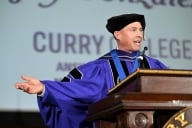You have /5 articles left.
Sign up for a free account or log in.
Geneva College, a Christian college in Pennsylvania, is suing the state for refusing to include its jobs -- which have religious requirements -- in a database of available positions.
In a complaint filed Friday in U.S. district court , lawyers with the Center for Law & Religious Freedom of the Christian Legal Society and the Alliance Defense Fund charge that in the state’s failure to provide employment and recruiting services for positions with religious criteria, the government is denying faith-based organizations their First Amendment rights. The lawyers argue that the First Amendment, along with Title VII of the 1964 Civil Rights Act and the Pennsylvania Human Relations Act, affirm the right of a religious institution to hire employees on the basis of faith.
“The thrust of it is the idea that the First Amendment provides the right of religious employers to hire people that share their religious beliefs. In this case, the state and the federal government are trying to coerce religious employers like Geneva College to forgo that right in order to participate in this job placement program,” said Timothy Tracey, a lawyer for the Center for Law & Religious Freedom.
The case surrounds Pennsylvania’s administration of the federal Workforce Investment Act of 1998, which funds and assists state efforts to provide employment and job training services. The act includes a stipulation that programs receiving federal assistance must comply with a nondiscrimination provision that expressly prohibits religious discrimination and does not exempt religious institutions. According to the complaint, the Pennsylvania Department of Labor and Industry informed Geneva College in 2004 that the department was “precluded from listing a job opening that would limit the applicant pool to members of one faith” on the agency’s CareerLink job database. In 2005, Geneva College administrators were told that they could not include the word “Christian” in job listings, except for jobs with “bona fide” religious requirements (such as to be a priest, one must be Roman Catholic).
Geneva, a Christian college governed by the Reformed Presbyterian Church of North America, requires all new hires to "demonstrate a credible Christian commitment." According to the complaint, "The inability of an applicant to articulate a personal faith commitment to Jesus Christ and be supportive of a Reformed worldview will have a direct impact on employment consideration.'"
The main defendants identified in the complaint are the secretaries for the U.S. and Pennsylvania labor departments. Multiple calls to the public relations office at the U.S. Department of Labor were not returned Tuesday, and Barry Ciccocioppo, press secretary for the Pennsylvania Department of Labor & Industry, said the agency had not yet been served the complaint. He added that he could not comment on pending litigation.
Geneva College’s press office, meanwhile, referred all comment to Tracey with the Center for Law & Religious Freedom.
Robert Tuttle, a professor of law and religion at George Washington University, said that a 2004 Supreme Court decision finding that while the government has the ability to extend government benefits to faith-based institutions, it does not have the obligation to do so on their terms, will likely present the biggest barrier to the plaintiffs’ case. In Locke v. Davey, a case involving the state of Washington’s Promise Scholarship, which provided funds to students to attend accredited public or private universities in-state but restricted the monies from going toward preparatory programs for the ministry, the court determined 7-2 that, as Tuttle said, “There may be good reasons for the government to treat religious organizations differently, and it can do so without violating the constitution.”
“The government, under current establishment clause law, is allowed to include religious organizations under federal funding programs. But the constitution doesn’t require that they be included, or included with full protections for the ability to hire people based on religion," Tuttle said.
At the same time, Tuttle said the Religious Freedom Restoration Act of the early 1990s, which has since been struck down for states but not for the federal government, might prove to be the plaintiffs’ best bet in court. If a court rules that the act applies, and Geneva College could demonstrate that the restriction imposes a significant burden on its expression of religious beliefs, the onus would be shifted to the government to demonstrate why the restriction would represent a “compelling public interest.”
In addition to Geneva College, the Association of Faith-Based Organizations, which includes Geneva among its more than 30 members, is also listed as a plaintiff. Tracey said that some of the members of the association are Christian colleges and universities, though he did not elaborate.








